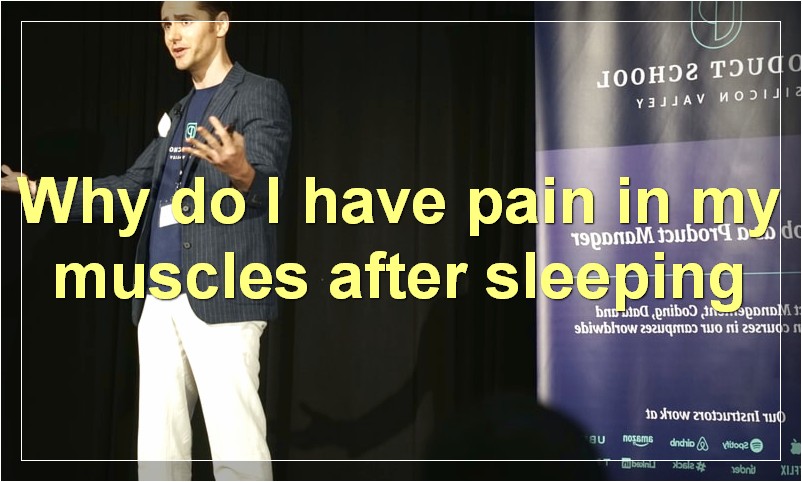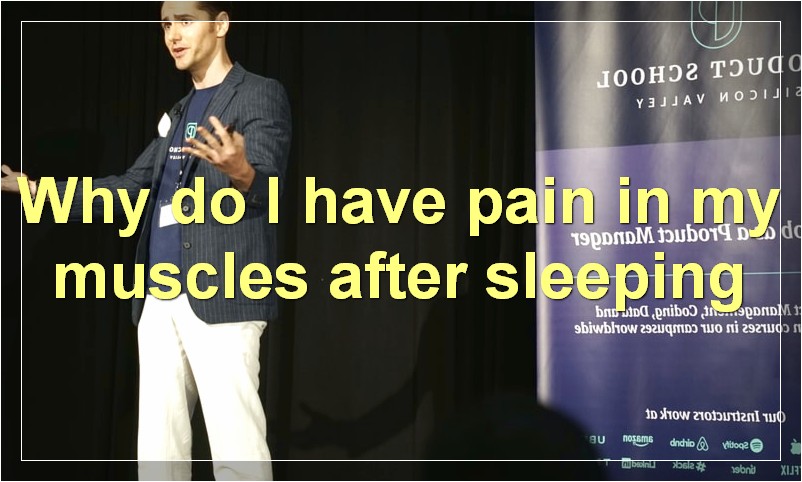You may have noticed that you sometimes wake up with minor aches and pains in your muscles or joints. This is most likely due to your sleep position, and it’s nothing to worry about. However, if you consistently wake up with pain, it could be a sign of a more serious problem.
Why do I have pain in my muscles after sleeping?

There are many potential causes of morning muscle pain. It could be due to tension in the muscles from poor sleeping posture, dehydration, or overuse. It’s important to rule out more serious causes of muscle pain, such as inflammation or infection. If you’re experiencing morning muscle pain on a regular basis, it’s best to see a doctor to determine the cause.
One possible cause of morning muscle pain is tension in the muscles from poor sleeping posture. This can happen if you sleep in an awkward position or on a surface that isn’t supportive enough. Over time, this can lead to muscle strain and pain. To avoid this, it’s important to sleep on a comfortable, supportive mattress and to use a pillow that keeps your neck in alignment with your spine.
Dehydration can also cause muscle pain, especially if you exercise regularly. When you sweat, you lose fluids and electrolytes that need to be replaced. If you don’t replace them, you may start to feel cramps and pain in your muscles. Drinking plenty of water and fluids throughout the day can help prevent dehydration and muscle pain.
Another possible cause of morning muscle pain is overuse. This can happen if you participate in activities that put repetitive stress on the same group of muscles. For example, runners may experience pain in their calves after running long distances. To avoid overuse injuries, it’s important to cross-train and give your body a chance to recover between workouts.
If you’re experiencing morning muscle pain on a regular basis, it’s best to see a doctor to determine the cause. There are many potential causes of morning muscle pain, and only a doctor can rule out more serious causes, such as inflammation or infection.
What could be causing my muscle pain after sleeping?
There are many potential causes of muscle pain after sleeping. It could be due to a poor sleep position, dehydration, or even a vitamin deficiency. However, the most likely cause is simply overuse.
If you’re someone who works out regularly, chances are you’ve experienced muscle pain after sleeping at some point. It’s not usually anything to be concerned about and can usually be remedied with some simple self-care measures.
If you’re experiencing muscle pain after sleeping, the first thing you should do is assess your sleep position. If you sleep on your stomach, you’re more likely to experience muscle pain, as this position puts unnecessary strain on your back and neck muscles. Sleeping on your side or on your back is generally much better for your muscles.
Dehydration can also cause muscle pain after sleeping. When you don’t drink enough fluids during the day, your body becomes dehydrated and your muscles can’t function properly. Be sure to drink plenty of water during the day and avoid diuretics like caffeine and alcohol before bed.
You may also be experiencing muscle pain after sleeping due to a vitamin deficiency. If you don’t eat a balanced diet, you may not be getting all the vitamins and minerals your body needs to function properly. Vitamin D is particularly important for muscle health, so be sure to get plenty of sunshine or take a supplement if you don’t eat enough foods that are rich in this vitamin.
The most likely cause of muscle pain after sleeping, however, is simply overuse. If you’ve been working out hard or engaging in activities that require repetitive motion, your muscles can become very sore. This is especially true if you haven’t been stretching properly or giving your muscles time to recover between workouts.
If you’re experiencing muscle pain after sleeping, try these simple self-care measures:
• Sleep in a different position: If you typically sleep on your stomach, try sleeping on your back or side instead. This will take the pressure off your muscles and allow them to recover while you sleep.
• Drink plenty of fluids: Dehydration can cause muscle pain, so make sure you’re drinking enough water during the day. Avoid diuretics like caffeine and alcohol before bed.
• Eat a balanced diet: A healthy diet provides your body with the nutrients it needs to function properly. If you think you may be deficient in certain vitamins or minerals, talk to your doctor about taking supplements.
• Stretch: Stretching helps prevent injuries and allows your muscles to recover from strenuous activity. Be sure to stretch before and after working out or engaging in any activity that requires repetitive motion.
• Give your muscles time to recover: Overusing your muscles can lead to pain and discomfort. Allow your muscles time to rest and recovery between workouts by scheduling rest days into your routine.
Why do I feel achy all over after waking up?
You may feel achy all over after waking up for any number of reasons. Maybe you slept in an awkward position and your muscles are stiff. Or maybe you’re coming down with something and your body is trying to fight it off.
There are a few different things that could be going on if you wake up feeling achy all over. It’s important to pay attention to other symptoms you might be experiencing, like a fever or fatigue, so you can get a better idea of what might be going on.
If you’re feeling achy all over and you can’t pinpoint why, it’s always best to check in with your doctor. They can help you figure out what might be causing your symptoms and recommend the best course of treatment.
How can I relieve muscle pain after sleeping?
We all know how it feels to wake up with a kink in our necks or a cramp in our legs. But what causes these morning aches and pains? More often than not, they’re the result of how you slept the night before. Here are four ways you can relieve muscle pain after sleeping.
1. Use a pillow that supports your head and neck.
If you find yourself waking up with neck pain, it could be because you’re not using a pillow that offers adequate support. Look for a pillow that is firm and high enough to fill the space between your mattress and your head. This will help keep your spine in alignment while you sleep.
2. Stretch before bed.
Stretching before bed can help loosen up your muscles and prevent them from becoming tense overnight. Try doing some gentle stretches for your neck, shoulders, and back before you turn in for the night.
3. Sleep on your side or on your stomach.
If you tend to sleep on your back, you may be putting unnecessary strain on your neck and back muscles. Sleeping on your side or on your stomach can help take the pressure off of these areas.
4. Invest in a comfortable mattress.
If you’re still waking up with muscle pain after trying all of the above, it may be time to invest in a new mattress. A mattress that is too soft or too firm can cause aches and pains. Look for a mattress that offers the right amount of support and comfort for you.
Why am I experiencing stiffness and pain after waking up?

Stiffness and pain after waking up can be caused by many things. It could be an indication of a more serious health condition, or it could be the result of sleeping in an awkward position. It could also be the result of muscle tension from stress. Whatever the cause, stiffness and pain after waking up is not a pleasant way to start the day.
There are a few things that you can do to help ease the stiffness and pain. First, try stretching your muscles gently. Taking a warm shower or bath can also help loosen up your muscles. If the pain is caused by arthritis, there are over-the-counter medications that can help. If you’re not sure what’s causing your stiffness and pain, it’s best to see a doctor to get a proper diagnosis.
Is there anything I can do to prevent muscle pain after sleeping?
Most people have experienced muscle pain after sleeping at some point in their lives. The pain is often described as a cramping or stiffness in the muscles, and it can range from being mildly annoying to severely debilitating. There are a number of possible causes for this type of pain, and luckily there are also a number of things you can do to prevent it.
One of the most common causes of muscle pain after sleeping is simply not getting enough exercise during the day. When we don’t use our muscles regularly, they can become weak and tight, making them more susceptible to pain when we do finally move them. This is why it’s important to make sure you get plenty of physical activity during the day, even if it’s just a brisk walk around the block.
Another potential cause of muscle pain after sleeping is an imbalance in the body’s electrolytes. These are minerals like sodium, potassium, and calcium that are responsible for helping to regulate muscle function. If you’re not getting enough of these electrolytes in your diet, it can lead to muscle cramping and pain. You can get more electrolytes by eating foods like bananas, sweet potatoes, and leafy greens, or by taking an over-the-counter supplement.
Dehydration is another possible cause of muscle pain after sleeping. When we’re dehydrated, our muscles don’t have enough fluid to work properly, which can lead to cramping and pain. Make sure you’re drinking plenty of water during the day, and avoid diuretics like caffeine and alcohol before bed.
If you frequently experience muscle pain after sleeping, it’s a good idea to talk to your doctor to rule out any underlying medical conditions. Once any potential medical causes have been ruled out, there are a few things you can do at home to help prevent the pain.
First, make sure you’re getting enough exercise during the day. As we mentioned before, weak and tight muscles are more likely to cause pain after sleeping. So, aim for at least 30 minutes of moderate-intensity exercise every day.
Second, eat a balanced diet that includes plenty of electrolyte-rich foods. This will help ensure your muscles are properly hydrated and functioning optimally.
Finally, practice good sleep hygiene. This means creating a relaxing sleep environment and following a consistent sleep schedule. It may also mean avoiding activities like working out or using electronic devices right before bedtime.
If you follow these tips, you should start to see a reduction in muscle pain after sleeping. However, if the pain persists or gets worse, be sure to talk to your doctor.
What are some possible causes of morning body aches?
Most people have experienced the occasional morning body ache. Waking up to a stiff neck or aching back is not fun, and it can make starting your day very difficult. While there are many potential causes of morning body aches, here are some of the most common:
1. Poor Sleep Position – One of the most common causes of morning body aches is sleeping in an awkward position. This can cause everything from neck and back pain to joint pain in your hips or shoulders. If you find yourself waking up with aches and pains, try changing your sleep position and see if that makes a difference.
2. Dehydration – Dehydration can cause all sorts of problems, including muscle cramps and headaches. If you’re not drinking enough water during the day, your body will be more susceptible to pain when you wake up in the morning. Make sure you’re staying hydrated by drinking plenty of fluids throughout the day.
3. Overuse Injuries – If you’ve been doing a lot of physical activity lately, you may be dealing with an overuse injury. These injuries occur when you repetitively use a certain muscle or joint, causing inflammation and pain. If you think you may have an overuse injury, rest the affected area and see a doctor if the pain doesn’t go away.
4. Arthritis – Arthritis is a common cause of morning body aches, especially in older adults. If you have arthritis, you may wake up feeling stiff and sore due to the inflammation in your joints. There are many different treatments for arthritis, so talk to your doctor about what would be best for you.
5. Stress – Stress can cause all sorts of physical problems, including muscle tension and headaches. If you’re feeling stressed out, try to relax by taking some deep breaths or doing some gentle stretching exercises. Reducing stress in your life may also help reduce the frequency of morning body aches.
Could my medication be causing my morning body pains?
Achy mornings are no fun. You wake up, feeling like you got hit by a truck overnight and every movement hurts. You’re not alone if you’ve ever experienced this—but the pain may have a surprising source: your medication.
We tend to think of medicine as helping us feel better, but sometimes it can have the opposite effect. In fact, many drugs come with the side effect of pain, which can range from mild discomfort to full-blown agony. If you’re struggling with morning body pains, here are a few medications that could be to blame.
Painkillers
You might take painkillers for a headache or cramps, but did you know that they can also cause pain? It’s true! Common pain relievers like ibuprofen and aspirin can actually irritate the stomach lining and cause abdominal pain. They can also cause joint pain, particularly in people with arthritis.
If you’re taking painkillers and experiencing morning body pains, talk to your doctor about whether the benefits of the medication outweigh the risks. There may be a different pain reliever that’s more effective and has fewer side effects.
Antidepressants
Antidepressants are designed to improve mood, but they can also come with some unpleasant side effects. For example, selective serotonin reuptake inhibitors (SSRIs) can cause joint pain. Tricyclic antidepressants (TCAs) can cause muscle aches. And monoamine oxidase inhibitors (MAOIs) can cause headaches.
If you’re taking an antidepressant and experiencing morning body pains, talk to your doctor. He or she may be able to prescribe a different medication that doesn’t cause pain as a side effect.
Blood pressure medication
High blood pressure is a serious condition that requires treatment, but the medication used to treat it can cause problems too. For example, beta blockers can cause fatigue and cold hands and feet. ACE inhibitors can cause dry cough and dizziness. And diuretics can cause dehydration and electrolyte imbalance.
If you’re taking blood pressure medication and experiencing morning body pains, talk to your doctor. He or she may be able to adjust your dosage or switch you to a different medication.
Morning body pains can be frustrating, but relief may be as simple as changing your medication. If you’re struggling with pain, talk to your doctor about whether your medication could be to blame—and what you can do about it.
Why do I sometimes wake up with a headache and body aches?
There are many possible explanations for why you might sometimes wake up with a headache and body aches. It could be something as simple as sleeping in an awkward position, or it could be a sign of a more serious underlying health condition.
One common explanation for morning headaches is dehydration. When you sleep, your body loses water through sweat and respiration, and if you don’t replenish those fluids, you may wake up with a headache. Drinking a glass of water as soon as you wake up can help prevent this type of headache.
Another possible cause of morning headaches is tension headaches. These are often caused by stress or anxiety, and they can be triggered by poor sleep habits. If you’re not getting enough restful sleep, your muscles may tense up during the night, leading to a headache in the morning.
If you regularly wake up with a headache and body aches, it’s important to see a doctor to rule out any underlying health conditions. Conditions like fibromyalgia and arthritis can cause chronic pain and fatigue, which can make it difficult to get a good night’s sleep. If you’re not sure what’s causing your symptoms, talk to your doctor about possible causes and treatment options.




